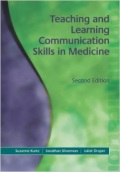Communication tips by Nursing on the Move.
 Are you a professional or a pre-professional?
Are you a professional or a pre-professional?
Do you use a second or foreign language at work?
Boost your professional interactions by trying the following tips.
Cues are signals by one person that are picked up by another. During a medical consultation, they generally point to patient’s emotions, ideas, concerns and expectations. Cues can be both verbal and nonverbal:
Examples of verbal cues:
– ‘I feel worse’ (incomplete message)
– ‘It doesn’t improve’ (vague message)
– ‘I have problems’ (emotional message)
– ‘It is always like that’ (generalisation)
Nonverbal cues can be found in the patient’s:
– Tone of voice (signalling, e.g. distress)
– Facial expression (signalling, e.g. depression)
– Eye movement (signalling, e.g. boredom)
– Posture (signalling, e.g. dislike)
Picking up verbal and nonverbal cues requires care and attention. A doctor cannot ignore patients’ cues: these cues are requests for help or for a response. How to respond to patient’s cues will be included in the communication tip for next month.

© Dilbert comics
You can find an overview of all communication tips by Communication for Professionals here.
 Teaching and Learning Communication Skills in Medicine
Teaching and Learning Communication Skills in Medicine
by Suzanne Kurtz. Jonathan Silverman
This book provides a comprehensive approach to improving communication in medicine. Fully updated and revised and greatly expanded this new edition examines how to construct a skills curriculum at all levels of medical education and across specialties, documents the individual skills that form the core content of communication skills teaching programmes and explores in depth the specific teaching, learning and assessment methods that are currently used within medical education.
Physician Gender Effects in Medical Communication
by Debra L. Roter, DrPH; Judith A. Hall, PhD; Yutaka Aoki
Physician gender has been viewed as a possible source of variation in the interpersonal aspects of medical practice, with speculation that female physicians facilitate more open and equal exchange and a different therapeutic milieu from that of male physicians. However, studies in this area are generally based on small samples, with conflicting results.
Tip: More up to date educational events dealing with healthcare can be found online on the Education Database »medicine & health«.

